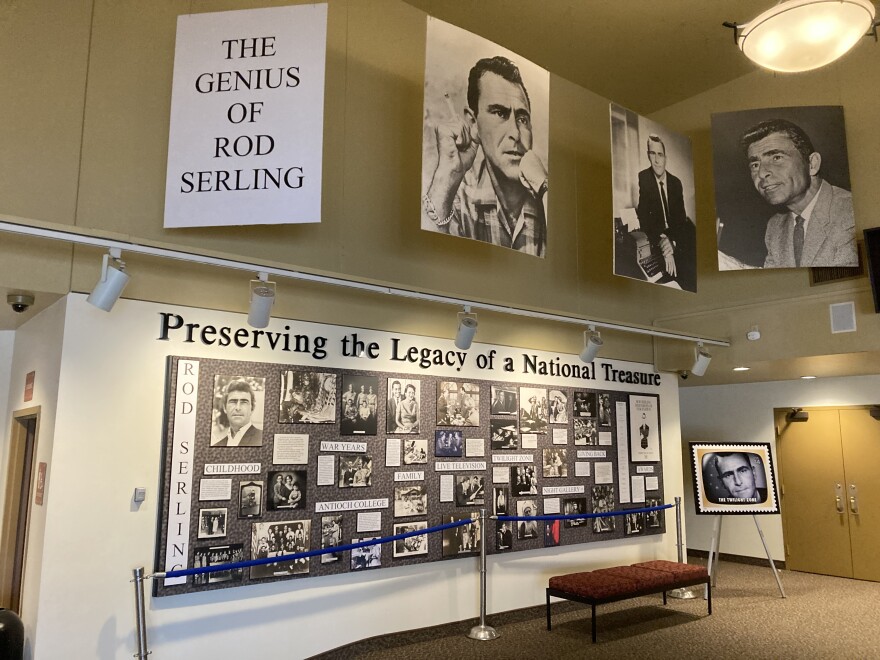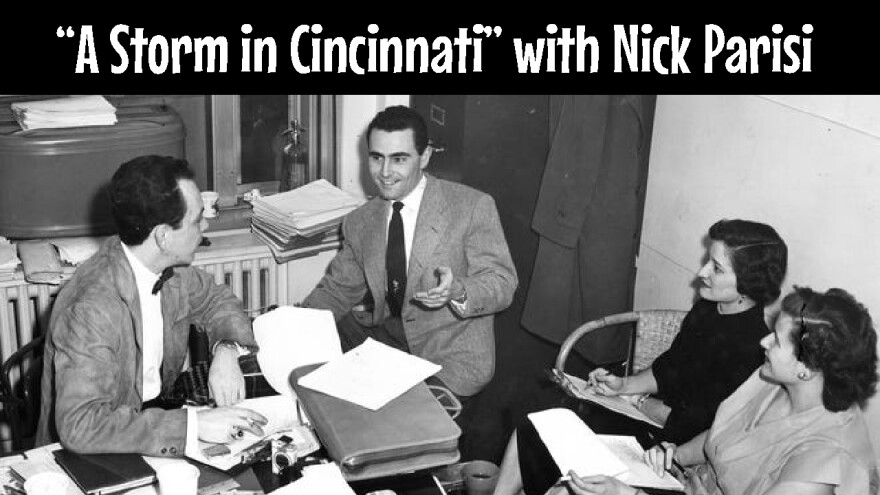I had a simple request: If I drove nine hours to the annual Rod Serling Festival in Binghamton, N.Y., where a local theater group would be reading Serling's O'Toole From Moscow script I adapted for WVXU, could I be the baseball announcer?
The Rod Serling Memorial Foundation planning committee said yes, so I drove to Binghamton last weekend.
To my surprise, the annual "Serlingfest" also featured a discussion of Serling starting his career at Cincinnati's WLW-AM and WKRC-TV in 1950-54, and a screening of No Gods To Serve, one of about 30 half-hour dramas he wrote for The Storm live TV series on WKRC-TV.
Yes, Cincinnati took Serlingfest by "storm" last weekend.
The gathering opened with foundation president Nick Parisi launching a Kickstarter campaign to raise $90,000 for a Rod Serling statue in Binghamton.

On Saturday afternoon, I joined actors from Binghamton's Southern Tier (of New York) Actors Read on stage at the beautifully restored Forum Theater in downtown Binghamton. We read/performed the O'Toole script I had adapted from Serling's 1955 NBC live TV comedy about confusion during the Cold War between the Russians and the Cincinnati Red Legs baseball club which resulted in a Communist spy playing centerfield (and hitting .400) for the Reds.
We stood at music stands, reading our parts from binders. It was the first time my script was read/performed for a live audience. (WVXU's production was recorded by University of Cincinnati College-Conservatory of Music students, under direction by Professor Richard Hess, and premiered on WVXU in March 2019.)

The gifted Southern Tier Actors really got into Serling's 1950s comedy. Their Russian accents were perfect. John Carey and Charles Berman added some clever physical comedy for the audience as they read lines about baseball-loving defector Boris Mushnick teaching Joseph "O'Toole" Bishofsky the "protocol" for swinging a baseball bat.
My role was to read the baseball announcer calling O'Toole's prodigious home runs. When co-director Joe Bardales struck a 2-by-4 board with a wood mallet, I read my lines. (You may detect Marty Brennaman's cadences in the words I wrote to replace a filmed sequence in Serling's 1955 telecast.)
"Swung on! Long shot to deep center field! Snider is back, and that ball is GONE! A home run!
"There it is! A line drive over the centerfield wall! That's O'Toole's fifth home run tonight! A new Major League record!"

We didn't have Reds organist John Schutte's music to wrap up the show, so we stepped in front of our music stands to close the show by singing "Take Me Out To The Ball Game."
I could scratch another item off my bucket list. I had found the O'Toole script, rewritten it and produced for the Cincinnati radio audience, and now I helped performed it for an audience, who laughed in all the right places, 65 years after Serling wrote it. (One more item is left on my O'Toole wish list: Do a similar read on stage for a Cincinnati audience. Maybe with some former Reds?)
On Sunday, about 30 people attended a session called "A Storm In Cincinnati" presented by Parisi, author of Rod Serling: His Life, Work and Imagination.

Parisi explained how Serling came to WLW after graduating from Antioch College in 1950, and grew frustrated writing sitcoms, travel shows and variety show patter. So at night he wrote dramas for The Storm on competitor WKRC-TV under the name of R. Edward Sterling. WKRC-TV filmed the "No Gods To Serve" episode in 1952 in hopes of convincing CBS to air the drama series live from Cincinnati on the network, as NBC was doing for WLWT-TV's Ruth Lyons' 50-50 Club and Midwestern Hayride variety shows.
"Nothing was on television like this. Nothing!" Parisi said of The Storm.
CBS didn't bite, and the show was canceled in May 1952. But The Storm, and executive producer Bob Huber, provided Serling a foundation for his career by giving him "all the freedom in the world. He gave Rod total creative freedom."
"No Gods To Serve" was a drama about five American soldiers hiding in a basement, behind enemy lines, during the Korean War. Serling also wrote an episode about people trapped in a mine shaft – prompting TV critics and some Serling experts to speculate that Serling must have felt trapped in an unhappy marriage.
Parisi said that wasn't the case. Serling, he said, wrote about people trapped underground due to the limitation of the WKRC-TV studios. I explained to the audience that the station, owned by the Taft family, was in the Taft's Times-Star newspaper building at 800 Broadway Downtown, on a floor with a normal office ceiling height.
After The Storm was canceled in 1952, Serling wrote and sold freelance scripts to Kraft Television Theatre, Studio One, Lux Video Theatre and other live TV series based in New York City until moving to Connecticut in October 1954.
Parisi showed how "Cincinnati adopted Rod Serling," displaying newspaper stories about live network TV shows written by "Cincinnati's Rod Serling." The Serling family moved to Los Angeles before The Twilight Zone premiered in 1959. He died in 1975, at age 50.

Marc Scott Zicree, author of The Twilight Zone Companion, said Serling never wanted to be a science-fiction writer. He was more interested with exploring social issues and the human spirit, similar to Pulitzer Prize-winning playwright Arthur Miller (Death Of A Salesman, The Crucible).
"Rod wanted to be the Arthur Miller of television. He wanted to talk about real life, real issues," Zicree said. "People watched The Twilight Zone because of the humanity. We identify with those people."
That's why The Twilight Zone still resonates with viewers today, six decades after its original airing on CBS. It's as timeless as infinity. And that's why the Serling foundation wants to erect a statue of him in his hometown.





